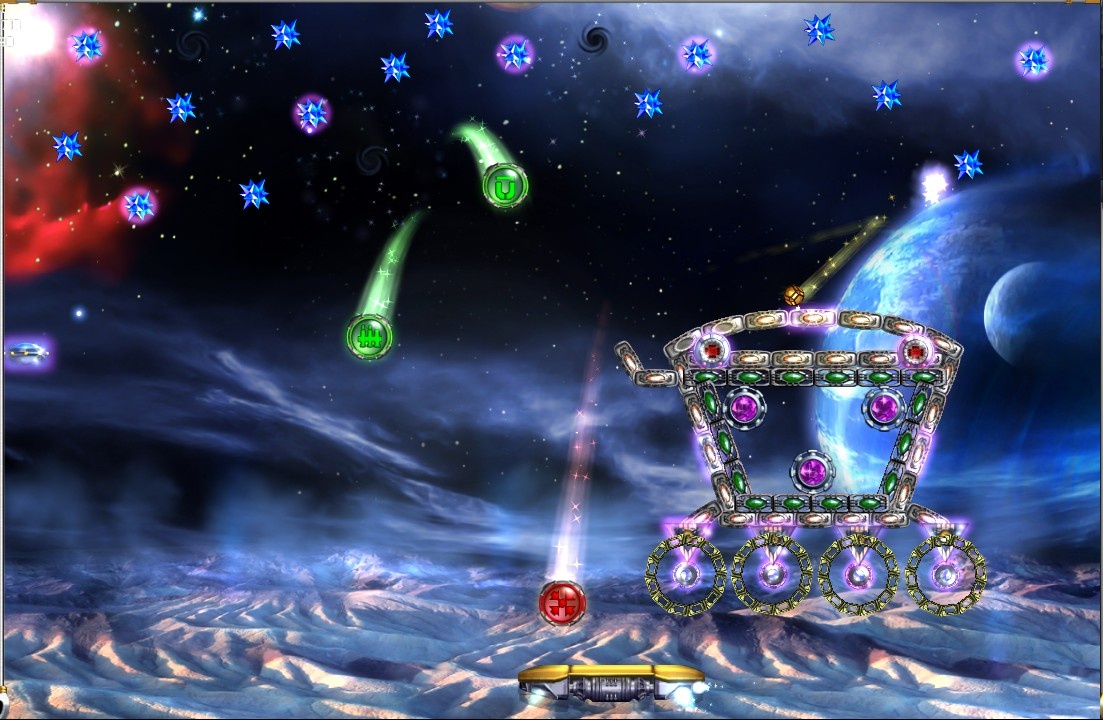Brick breaking has come a long way since the days of Breakout and Arkanoid, with recent titles taking the simple paddle, ball, and bricks setup and freshening it up by adding unique twists. But while games such as Shatter and Nervous Brickdown have won plaudits, Hyperballoid HD's take on this classic genre fails to bust through. Though the game shares the same features as other modern brick breakers--power-ups, different types of bricks, and shifting playfields--Hyperballoid HD is mainly devoid of the fun and exciting moments that other games of its ilk provide. Hyperballoid HD gets the basics right, but it's a chore to finish most of its levels.
Your goal in Hyperballoid HD is to clear a screen filled with bricks by destroying them one at a time using only a paddle and a bouncing ball. If you fail to rebound the ball with the paddle, you lose a life, and the game's physics feel just right as you try to deftly manoeuvre the ball around the screen. This is easily done using the PlayStation 3 controller's analog stick, with the X button used to deploy any power-ups you may have. You can also use the controller's tilt functionality to move your paddle along the bottom of the screen, but it's nowhere near as responsive as using the analog stick.
The majority of bricks in Hyperballoid HD aren't pushovers: most require several hits to destroy, some blink in and out of the playfield, others move around the screen, and the toughest ones are invulnerable to the basic ball. Power-ups are your way past these obstacles, and special glowing bricks hold these vital goodies. These power-ups imbue either your paddle or your ball (or both) with special abilities, and there's a good variety to be found. Some will suddenly triple the number of balls onscreen, give you the ability to directly control a ball's path, or even make your ball explosive and able to bust through anything. Paddle power-ups are just as varied: for example, one basic improvement increases the width of the paddle, another spawns a second AI-powered paddle, and others will mount a cannon or ultrapowerful laser that can cut through an entire column of bricks.
The game can be involving early on in each level when there are plenty of bricks onscreen and power-ups are falling generously, but things turn bland quickly from there. As the number of bricks on each playfield decreases, you find yourself dully batting the ball back and forth as you wait for just the right conditions to pop up in order to destroy the remaining bricks. This could involve waiting for a small group of bricks phasing in and out of the playfield to reappear, hitting the same brick numerous times until it breaks, or hoping for a very specific power-up to appear in order to bust through a few strays which are otherwise impervious to your normal ball. It's disappointing to find that most of the 100 levels in Hyperballoid HD end up being boring to finish, with levels ending in a whimper rather than in excitement because you've spent the last few minutes trying to eradicate a few recalcitrant bricks. In fact, the power-up you'll probably most look forward to seeing in Hyperballoid HD is the one which allows you to skip a level once you've cleared the majority of bricks off the screen.

Hyperballoid HD's bland presentation doesn't do much to ramp up the proceedings. While the game runs at 1080p, there's not much to see apart from a few impressive particle effects with some of the more flashy power-ups. The game's backgrounds--which feature either a futuristic or an ancient motif--aren't interesting to look at, although some of the brick formations (such as those shaped like weapons, ankhs, spaceships, and other objects) are intricate and detailed. The music is similarly monotone. Ancient-themed levels come with generic classical music, while the futuristic planet levels are predictably scored with by-the-numbers dance beats.
Hyperballoid HD tries to imbue the genre with exciting additions, but it only manages to complicate matters by diluting the simple and immediate fun of brick breaking and ending up with levels that are a chore to complete. Hyperballoid HD--which costs $5.99 on the PlayStation Network--can be appealing in bursts, but if you're in the mood for some paddle and bouncing-ball action, there are better options available.